Rachel Friedman's blog
Stoking the Fire
Sun, 09/20/2015 - 01:33 — Rachel Friedman“We are going to have a controversial discussion, but a respectful one.”
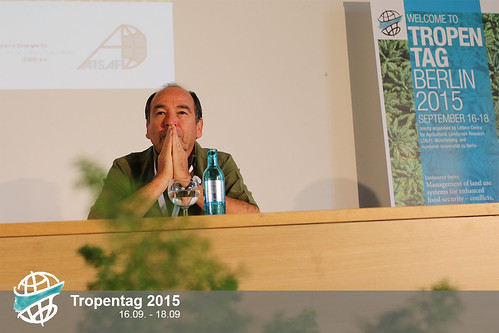
I had been waiting for some conflict and controversy...for nearly three days. It was decidedly inconspicuous at a conference bearing those very words in its title. But now, here was conference organizer Stefan Sieber promising that controversy in the closing keynotes and plenary. The speakers, and their topics of choice, followed one of the most fundamental debates in the fields of agriculture and rural development - pitting the core philosophies around technology dissemination and institutional support versus grassroots innovation and social movements against one another.
Some Expert Opinions: Chatting with the IITA
Sat, 09/19/2015 - 07:45 — Rachel Friedman
“We are placing research within development...These models are new, but I think they are working.” Bernard Vanlauwe from IITA argued during his closing keynote. Emerging mechanisms to approach agricultural research and how to link it to on-the-ground application were themes across the Centre’s research.
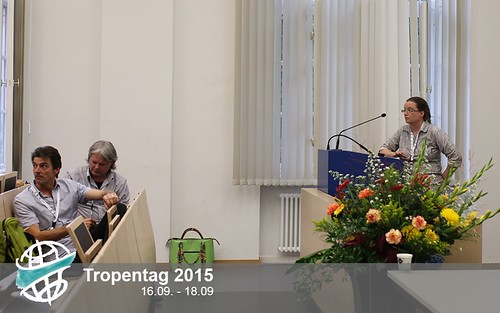 Each year at Tropentag, one of the research centres of the CGIAR* is featured as a means of forging collaboration and furthering research for development. This year, the International Institute for Tropical Agriculture (IITA) filled that role, and works through partnerships and with farmers to improve food security and livelihoods. As the focal organization, IITA brought along a dozen or so experts, some of whom spared a moment to impart a few words of wisdom.
Continue...
Each year at Tropentag, one of the research centres of the CGIAR* is featured as a means of forging collaboration and furthering research for development. This year, the International Institute for Tropical Agriculture (IITA) filled that role, and works through partnerships and with farmers to improve food security and livelihoods. As the focal organization, IITA brought along a dozen or so experts, some of whom spared a moment to impart a few words of wisdom.
Continue...
 Each year at Tropentag, one of the research centres of the CGIAR* is featured as a means of forging collaboration and furthering research for development. This year, the International Institute for Tropical Agriculture (IITA) filled that role, and works through partnerships and with farmers to improve food security and livelihoods. As the focal organization, IITA brought along a dozen or so experts, some of whom spared a moment to impart a few words of wisdom.
Continue...
Each year at Tropentag, one of the research centres of the CGIAR* is featured as a means of forging collaboration and furthering research for development. This year, the International Institute for Tropical Agriculture (IITA) filled that role, and works through partnerships and with farmers to improve food security and livelihoods. As the focal organization, IITA brought along a dozen or so experts, some of whom spared a moment to impart a few words of wisdom.
Continue...
Awarding for Excellence in Agricultural Research
Fri, 09/18/2015 - 11:32 — Rachel Friedman Every year, the Stiftung Fiat Panis awards a number of prizes to PhD and masters students in Germany, Switzerland, and Austria for exemplary theses related to food security. Professor Dr. Hans-Hartwig Ruthenberg, after whom the award is named, was a tropical and subtropical agronomist from Germany. Tropentag hosts the award ceremony, to acknowledge bright young minds, innovation, and excellence. This year’s three recipients demonstrate the interdisciplinarity of the topic of food security, drawing together health and nutrition, climate and weather, and ecology.
Ramona Molitor: “Testing the fetal origins hypothesis: The case of rainfall shocks in India”, Georg-August-Universität Göttingen.
Dominic Meise: “Food Security in Stung Treng, Cambodia - An Empirical Assessment”. Leibniz Universität Hannover
Sarah Fischer: “The baobab (Adansonia digitata L.) in southern Kenya - A study on status, distribution, use, and importance in Taita-Taveta County”, Universität Hohenheim
**Photo coming shortly
Every year, the Stiftung Fiat Panis awards a number of prizes to PhD and masters students in Germany, Switzerland, and Austria for exemplary theses related to food security. Professor Dr. Hans-Hartwig Ruthenberg, after whom the award is named, was a tropical and subtropical agronomist from Germany. Tropentag hosts the award ceremony, to acknowledge bright young minds, innovation, and excellence. This year’s three recipients demonstrate the interdisciplinarity of the topic of food security, drawing together health and nutrition, climate and weather, and ecology.
Ramona Molitor: “Testing the fetal origins hypothesis: The case of rainfall shocks in India”, Georg-August-Universität Göttingen.
Dominic Meise: “Food Security in Stung Treng, Cambodia - An Empirical Assessment”. Leibniz Universität Hannover
Sarah Fischer: “The baobab (Adansonia digitata L.) in southern Kenya - A study on status, distribution, use, and importance in Taita-Taveta County”, Universität Hohenheim
**Photo coming shortly Morning Cuppa: The Agroforestry Behind Our Coffee Breaks
Fri, 09/18/2015 - 09:10 — Rachel Friedman
At conferences, we live for coffee breaks. They are the times when we take a breather from presentation after presentation, the places where we meet new people and reconnect with old colleagues, and of course the spot to refuel. For many of us, that sustenance of choice is coffee, and (at least in my book) chocolate-covered biscuits are the best complement. That’s all pretty standard for organized events. But what makes the coffee breaks at a meeting like Tropentag unique is the array of experts present to relay the story behind the coffee, tea, biscuits, and fruit.
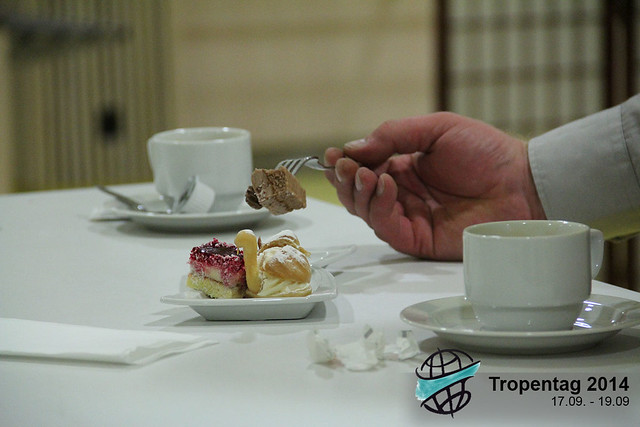 So as I wandered around posters this morning, it struck me that these studies are not merely relevant to those specific geographies or ecosystems and to the local people and communities. There are also ties not very far removed from life outside of our study sites. And yet, we don’t always or even often think about what lies beyond the mug when sipping at a conference venue.
Continue...
So as I wandered around posters this morning, it struck me that these studies are not merely relevant to those specific geographies or ecosystems and to the local people and communities. There are also ties not very far removed from life outside of our study sites. And yet, we don’t always or even often think about what lies beyond the mug when sipping at a conference venue.
Continue...
 So as I wandered around posters this morning, it struck me that these studies are not merely relevant to those specific geographies or ecosystems and to the local people and communities. There are also ties not very far removed from life outside of our study sites. And yet, we don’t always or even often think about what lies beyond the mug when sipping at a conference venue.
Continue...
So as I wandered around posters this morning, it struck me that these studies are not merely relevant to those specific geographies or ecosystems and to the local people and communities. There are also ties not very far removed from life outside of our study sites. And yet, we don’t always or even often think about what lies beyond the mug when sipping at a conference venue.
Continue...
Day 1: Check-In, Keynotes, and Coffee Breaks
Wed, 09/16/2015 - 19:17 — Rachel Friedman
Recap from today!
Challenging the Old Gray Horses: Interview with Louwrens Hoffman, Part II
Wed, 09/24/2014 - 00:36 — Rachel Friedman
For more, you can also access the blog post and part I of the video.
Outside the Box: Animal Agriculture Beyond the Feedlot
Wed, 09/24/2014 - 00:32 — Rachel Friedman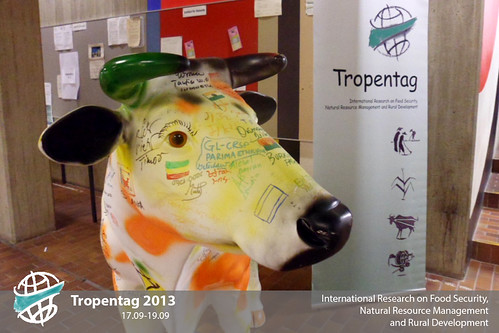 You might wonder why, as a long-time vegetarian, I am writing on a topic that so blatantly opposes my own dietary inclinations. Yet, the topic of the keynote address given by Louwrens Hoffman at Tropentag’s closing plenary is exactly why I must. Though many choose vegetarianism in response to animal welfare issues or because they “love” animals too much to eat them, consuming few or no animal products is a growing response to an unsustainable system of meat production. The livestock sector accounts for 18% of global greenhouse gas emissions, and contributes to soil erosion and freshwater pollution. At the same time, over a quarter of the Earth’s land surface is not suitable for growing crops, yet could support livestock.
(Continue...)
You might wonder why, as a long-time vegetarian, I am writing on a topic that so blatantly opposes my own dietary inclinations. Yet, the topic of the keynote address given by Louwrens Hoffman at Tropentag’s closing plenary is exactly why I must. Though many choose vegetarianism in response to animal welfare issues or because they “love” animals too much to eat them, consuming few or no animal products is a growing response to an unsustainable system of meat production. The livestock sector accounts for 18% of global greenhouse gas emissions, and contributes to soil erosion and freshwater pollution. At the same time, over a quarter of the Earth’s land surface is not suitable for growing crops, yet could support livestock.
(Continue...)
Building Blocks: Learning from Gender Studies to Close Gaps
Tue, 09/23/2014 - 21:34 — Rachel Friedman
“Gender” has become quite a buzzword in development circles these days. This is increasingly evident with prominent publications by the UN Food and Agriculture Organization and the emergence of the new UN Women. Though at the moment this topic may be en vogue, the long-time neglected issues related to gender are important blocks missing in the bridge from agricultural research to practice. It was therefore encouraging to see several posters at this year’s Tropentag conference conveying the multi-faceted nature of gender-sensitive approaches and issues.
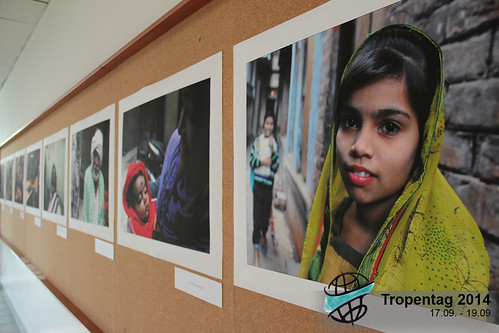 (Continue...)
(Continue...)
 (Continue...)
(Continue...)




